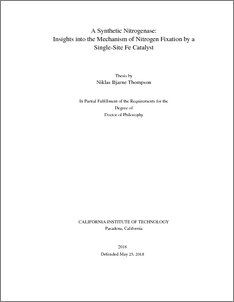Abstract
Nitrogen fixation, specifically the conversion of molecular nitrogen into ammonia, is a fundamental reaction necessary to support life. Our group has recently discovered the first family of well-defined iron complexes that catalyze the conversion of dinitrogen to ammonia. This thesis details mechanistic study of the nitrogen fixation chemistry these complexes. Chapter 1 presents an abbreviated overview of catalytic nitrogen fixation, which places our work in a larger context. Chapter 2 details the synthesis and nitrogen fixation activity of a series of cobalt complexes that are homologous to the known iron-based catalysts. The central goal of this work was to provide a structure-function study of the isostructural cobalt and iron complexes, in which the nature of the transition metal ion was changed in a fashion that predictably modulated the electronics of the system. Chapter 3 details in situ mechanistic studies of nitrogen fixation catalyzed by the iron complexes under the originally-reported reaction conditions. In this study, we were able to achieve a nearly order-of-magnitude improvement of catalyst turnover. Study of the reaction dynamics evidence a single-site mechanism for dinitrogen reduction, which is corroborated by in situ monitoring of catalytic reaction mixtures using freeze-quench Mössbauer spectroscopy. In Chapter 4, we study the key N-N bond cleavage step in the catalytic cycle for nitrogen fixation. In this chapter, we demonstrate that sequential reduction and low-temperature protonation of an iron catalyst results in the formation of ammonia and a terminal Fe(IV) nitrido complex. This result provides a compelling proposal for the mechanism of the catalytic nitrogen fixation reaction. Finally, in Chapter 5 we present spectroscopic and computational studies detailing the electronic structures of a redox series of Fe(NNR2) complexes that model key catalytic intermediates occurring prior to the N-N bond cleavage step. We evidence one-electron redox non-innocence of the “NNR2” ligand, which resembles that of the classically non-innocent ligand, NO, and may have mechanistic implications for the divergent nitrogen fixation activity of the some of the iron complexes studied by our group.
| Item Type: | Thesis (Dissertation (Ph.D.)) |
|---|
| Subject Keywords: | Nitrogen fixation; ammonia synthesis; Fe catalysis |
|---|
| Degree Grantor: | California Institute of Technology |
|---|
| Division: | Chemistry and Chemical Engineering |
|---|
| Major Option: | Chemistry |
|---|
| Thesis Availability: | Public (worldwide access) |
|---|
| Research Advisor(s): | |
|---|
| Group: | Resnick Sustainability Institute |
|---|
| Thesis Committee: | - Agapie, Theodor (chair)
- Fu, Gregory C.
- Chan, Garnet K.
- Peters, Jonas C.
|
|---|
| Defense Date: | 25 May 2018 |
|---|
| Funders: | | Funding Agency | Grant Number |
|---|
| NIH | GM 070757 |
|
|---|
| Record Number: | CaltechTHESIS:05292018-165300346 |
|---|
| Persistent URL: | https://resolver.caltech.edu/CaltechTHESIS:05292018-165300346 |
|---|
| DOI: | 10.7907/T4WQ-TM68 |
|---|
| Related URLs: | |
|---|
| ORCID: | |
|---|
| Default Usage Policy: | No commercial reproduction, distribution, display or performance rights in this work are provided. |
|---|
| ID Code: | 10965 |
|---|
| Collection: | CaltechTHESIS |
|---|
| Deposited By: |
Niklas Thompson
|
|---|
| Deposited On: | 01 Jun 2018 18:51 |
|---|
| Last Modified: | 08 Nov 2023 00:44 |
|---|
![[img]](https://thesis.library.caltech.edu/10965/31.hassmallThumbnailVersion/thompson_niklas_2018.pdf)  Preview |
|
PDF
- Final Version
See Usage Policy.
50MB |
Repository Staff Only: item control page


